Trong các nhà máy hóa chất, lò phản ứng và trục khuấy hoạt động trong điều kiện khắc nghiệt. Chúng xử lý áp suất cao, hóa chất ăn mòn và chuyển động liên tục.
Một lần rò rỉ có thể gây tốn kém thời gian ngừng hoạt động, ô nhiễm sản phẩm hoặc thậm chí là nguy cơ mất an toàn. Vòng đệm cacbua đã trở thành sự lựa chọn ưu tiên để bảo vệ các hệ thống này.
Bài viết này giải thích lý do tại sao vòng đệm cacbua rất cần thiết cho lò phản ứng hóa học và trục khuấy, cách chúng hoạt động trong điều kiện khắc nghiệt và những điều người ra quyết định nên cân nhắc khi lựa chọn chúng.
Những thách thức trong lò phản ứng hóa học và máy khuấy
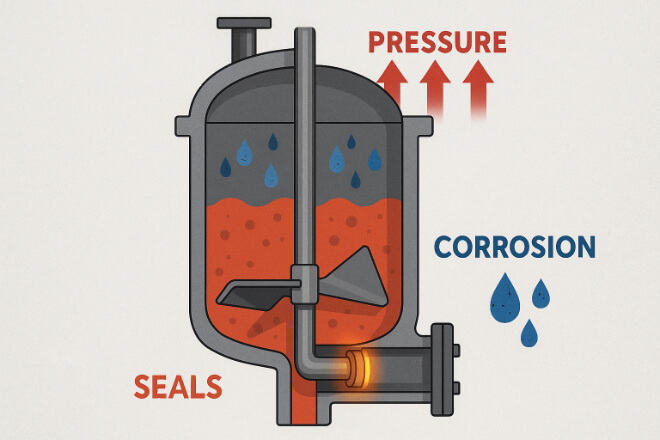
Hóa chất ăn mòn có thể nhanh chóng làm hỏng lớp niêm phong.
Áp suất và nhiệt độ cao gây áp lực lên thiết bị.
Hoạt động liên tục gây ra hiện tượng mài mòn và ma sát.
Quy định về an toàn yêu cầu phải bịt kín đáng tin cậy để ngăn ngừa rò rỉ nguy hiểm.
Các vật liệu làm kín thông thường như thép không gỉ hoặc than chì có thể nhanh hỏng trong những điều kiện này. Vòng đệm cacbua là giải pháp tốt hơn.
Tại sao nên chọn vòng đệm cacbua
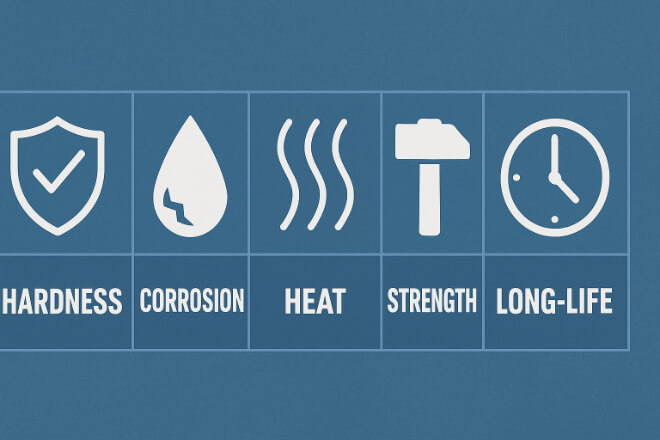
1). Cao cấp Độ cứng Và Khả năng chống mài mòn
Cacbua cứng gần bằng kim cương. Nó chống trầy xước và các hạt mài mòn gây ra sự mài mòn nhanh chóng trong quá trình trộn hóa chất.
Cacbua liên kết niken có thể chịu được axit, dung môi và kiềm thường được sử dụng trong lò phản ứng.
3). Sức mạnh và Độ dẻo dai
Cacbua liên kết coban mang lại độ bền, ngăn ngừa nứt dưới áp suất cao hoặc tải trọng va đập trên trục khuấy.
4). Độ ổn định nhiệt
Vòng cacbua vẫn duy trì hiệu suất bịt kín ngay cả ở nhiệt độ cao trong phản ứng hóa học.
5). Tuổi thọ dài hơn
Ít thay thế hơn có nghĩa là chi phí bảo trì thấp hơn và thời gian chết giảm.
Ứng dụng trong lò phản ứng hóa học
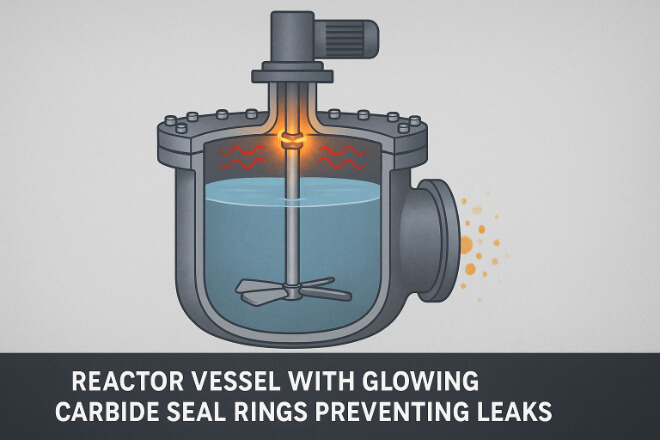
1). Phớt lò phản ứng
Lò phản ứng chứa các hóa chất có khả năng phản ứng cao. Vòng cacbua đảm bảo độ kín khít, ngăn ngừa rò rỉ có thể làm nhiễm bẩn sản phẩm hoặc gây hại cho người lao động.
2). Lò phản ứng áp suất cao
Trong các phản ứng áp suất cao, vòng cacbua chịu được ứng suất và duy trì tính toàn vẹn trong khi các vật liệu mềm hơn bị hỏng.
3). Lò phản ứng môi trường ăn mòn
Phớt cacbua liên kết niken có khả năng chống lại sự tấn công của hóa chất trong các quá trình có tính axit hoặc kiềm.
Ứng dụng trong trục khuấy
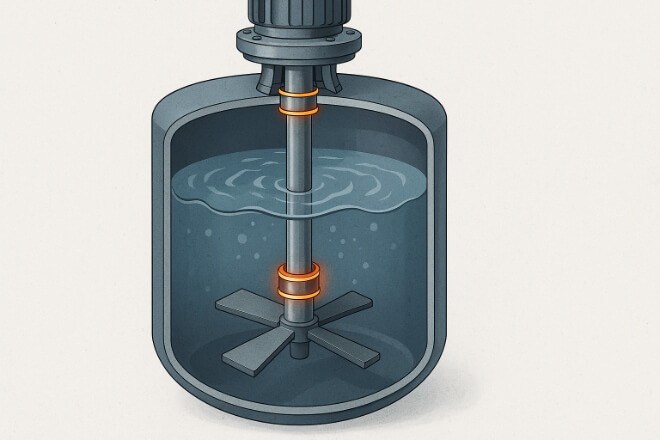
1). Bồn và bình trộn
Trục khuấy quay liên tục. Phớt cacbua làm giảm ma sát và mài mòn, kéo dài tuổi thọ trục và ổ trục.
2). Sản xuất Polymer và Nhựa
Trong môi trường dính hoặc mài mòn, vòng cacbua giữ được độ kín đáng tin cậy, ngăn ngừa rò rỉ trong quá trình trộn.
3). Dược phẩm và chế biến thực phẩm
Vòng cacbua đánh bóng mang lại khả năng hoạt động vệ sinh, không rò rỉ trong môi trường được kiểm soát.
Lợi ích cho các nhà máy hóa chất
| Lợi ích | Sự miêu tả |
|---|---|
| Phòng ngừa rò rỉ | Việc bịt kín chặt chẽ giúp tránh rò rỉ hóa chất nguy hiểm. |
| Tuổi thọ dài hơn | Chống ăn mòn và mài mòn, giảm tần suất thay thế. |
| Cải thiện an toàn | Giảm nguy cơ tràn hóa chất và nguy cơ phơi nhiễm của công nhân. |
| Hiệu quả chi phí | Ít lỗi hơn có nghĩa là ít thời gian chết hơn và chi phí bảo trì thấp hơn. |
| Độ tin cậy của quy trình | Các mối hàn ổn định đảm bảo phản ứng hóa học diễn ra đồng đều và chất lượng sản phẩm. |
Nghiên cứu điển hình
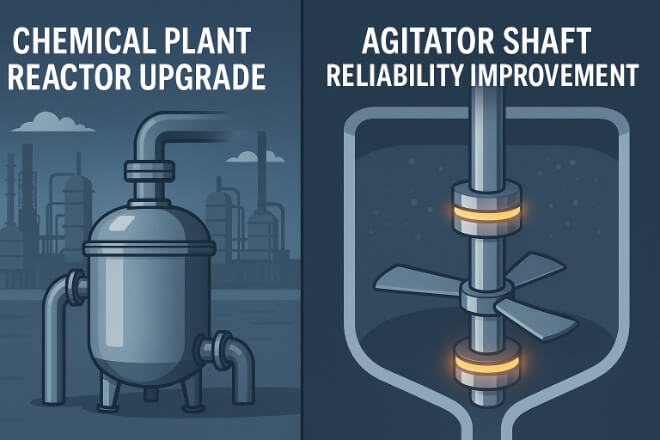
1). Nâng cấp lò phản ứng hóa học
Một nhà máy hóa chất đã chuyển từ phớt thép không gỉ sang vòng cacbua liên kết niken. Kết quả: tuổi thọ phớt tăng gấp đôi và thời gian ngừng hoạt động ngoài dự kiến giảm 40%.
2). Độ tin cậy của trục khuấy
Một cơ sở sản xuất polymer đã thay thế phớt gốm bằng vòng cacbua. Kết quả: cải thiện độ đồng nhất của hỗn hợp và giảm chi phí bảo trì.
Cách chọn vòng đệm cacbua phù hợp
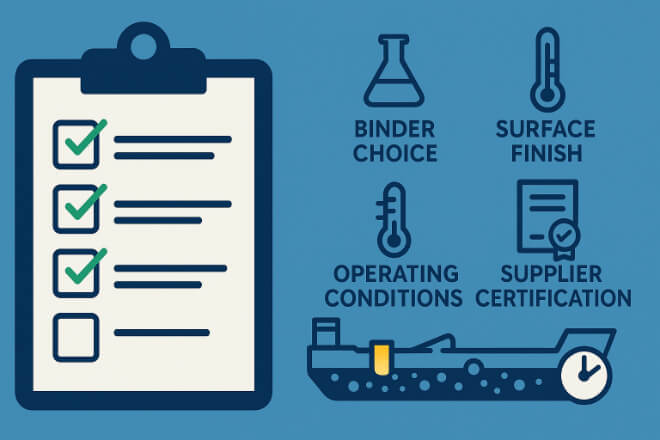
1). Loại chất kết dính
Sử dụng cacbua liên kết niken cho môi trường hóa chất ăn mòn.
Chọn cacbua liên kết coban để chịu tải trọng va đập và ứng suất cơ học cao.
2). Hoàn thiện bề mặt
Bề mặt cacbua đánh bóng giúp giảm ma sát và nhiệt ở trục khuấy.
3). Điều kiện vận hành
Xem lại áp suất, nhiệt độ và khả năng tương thích hóa học.
4). Chuyên môn của nhà cung cấp
Làm việc với các nhà cung cấp được chứng nhận ISO có kinh nghiệm trong ứng dụng công nghiệp hóa chất.
Chiến lược bảo trì và thay thế
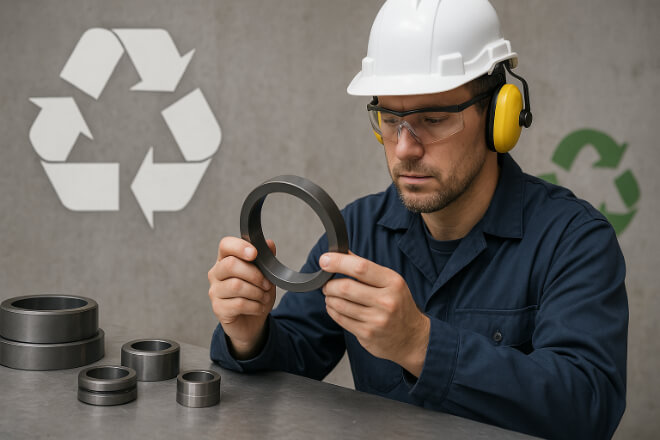
Kiểm tra phớt thường xuyên để phát hiện tình trạng mòn, nứt hoặc ăn mòn.
Thay thế phớt chủ động để tránh phải ngừng hoạt động tốn kém.
Dự trữ vòng cacbua dự phòng cho các thiết bị quan trọng.
Tái chế các thành phần cacbua bị mòn để giảm thiểu chất thải và chi phí.
Cân nhắc về chi phí và ROI

Đầu tư ban đầu: Cao hơn so với loại phớt tiêu chuẩn.
Tiết kiệm: Tỷ lệ hỏng hóc thấp hơn giúp giảm thời gian ngừng hoạt động và sửa chữa ngoài ý muốn.
ROI: Độ an toàn được cải thiện, chất lượng sản phẩm đồng đều và tuổi thọ dài hơn giúp cân bằng chi phí.
Ưu điểm về môi trường và an toàn
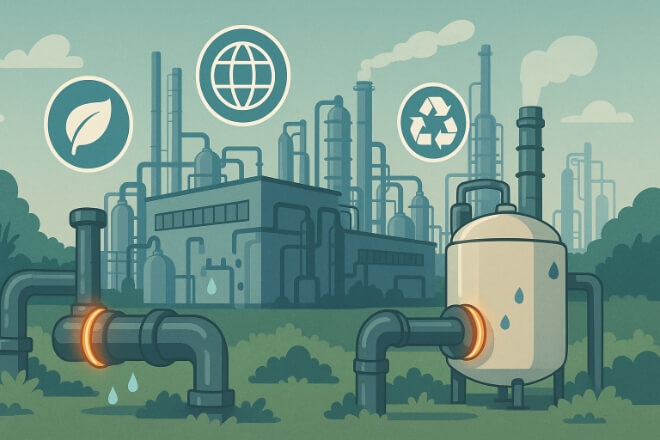
Vòng đệm cacbua giúp nhà máy tránh được sự cố tràn hóa chất có thể gây hại cho người lao động hoặc môi trường. Việc bịt kín đáng tin cậy hỗ trợ việc tuân thủ các quy định về an toàn và tiêu chuẩn môi trường.
Phần kết luận
Vòng đệm cacbua rất cần thiết cho lò phản ứng hóa học và trục khuấy. Độ cứng, khả năng chống ăn mòn và độ bền của chúng đảm bảo hoạt động an toàn và hiệu quả trong điều kiện khắc nghiệt.
Đối với những người ra quyết định, việc lựa chọn vòng đệm cacbua có nghĩa là ít hỏng hóc hơn, chi phí thấp hơn và nơi làm việc an toàn hơn—những lợi thế quan trọng trong ngành công nghiệp hóa chất cạnh tranh ngày nay.
Nếu bạn muốn biết thêm chi tiết về bất kỳ công ty nào, vui lòng liên hệ với chúng tôi.
